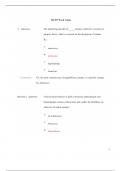-
1. Other - Nr507 final exam possible questions a-z / nr 507 final study guide (up-to-date, 2023-...
-
2. Exam (elaborations) - Nr507 final exam (up-to-date, 2023-2024, version-1) / nr 507 final exam / nr507 week ...
-
3. Exam (elaborations) - Nr507 final exam (up-to-date, 2023-2024, version-2) / nr 507 final exam / nr507 week ...
-
4. Exam (elaborations) - Nr507 final exam (up-to-date, 2023-2024, version-3) / nr 507 final exam / nr507 week ...
-
5. Exam (elaborations) - Nr507 final exam (up-to-date, 2023-2024, version-4) / nr 507 final exam / nr507 week ...
-
6. Exam (elaborations) - Nr507 final exam (up-to-date, 2023-2024, version-6) / nr 507 final exam / nr507 week ...
-
7. Exam (elaborations) - Nr507 final exam (up-to-date, 2023-2024, version-5) / nr 507 final exam / nr507 week ...
-
8. Exam (elaborations) - Nr507 final exam (up-to-date, 2023-2024, version-7) / nr 507 final exam / nr507 week ...
-
9. Other - Nr507 final exam study guide (v2)(up-to-date, 2023-2024) / nr 507 final exam study gu...
-
10. Other - Nr507 final exam study guide(v1)(up-to-date, 2023-2024) / nr 507 final exam study gui...
-
11. Exam (elaborations) - Nr507 midterm exam (up-to-date, 2023-2024, version-1) / nr 507 midterm exam / nr507 w...
-
12. Exam (elaborations) - Nr507 midterm exam (up-to-date, 2023-2024, version-2) / nr 507 midterm exam / nr507 w...
-
13. Exam (elaborations) - Nr507 midterm exam (up-to-date, 2023-2024, version-3) / nr 507 midterm exam / nr507 w...
-
14. Exam (elaborations) - Nr507 midterm exam (up-to-date, 2023-2024, version-4) / nr 507 midterm exam / nr507 w...
-
15. Exam (elaborations) - Nr507 midterm exam (up-to-date, 2023-2024, version-5) / nr 507 midterm exam / nr507 w...
-
16. Exam (elaborations) - Nr507 midterm exam (up-to-date, 2023-2024, version-6) / nr 507 midterm exam / nr507 w...
-
17. Other - Nr507 midterm exam study guide (v2)(up-to-date, 2023-2024) / nr 507 midterm exam stud...
-
18. Other - Nr507 midterm exam study guide (v1)(up-to-date, 2023-2024) / nr 507 midterm exam stud...
-
19. Exam (elaborations) - Nr507 question bank / test bank (up-to-date, 2023-2024) / nr 507 advanced pathophysio...
-
20. Exam (elaborations) - Nr507 week 1 quiz (v2,up-to-date, 2023-2024)/ nr 507 week 1 quiz: advanced pathophysi...
-
21. Exam (elaborations) - Nr507 week 1 quiz (v1,up-to-date, 2023-2024)/ nr 507 week 1 quiz: advanced pathophysi...
-
22. Exam (elaborations) - Nr507 week 2 quiz (v2,up-to-date, 2023-2024)/ nr 507 week 2 quiz: advanced pathophysi...
-
23. Exam (elaborations) - Nr507 week 2 quiz (v1,up-to-date, 2023-2024)/ nr 507 week 2 quiz: advanced pathophysi...
-
24. Exam (elaborations) - Nr507 week 3 quiz (v2,up-to-date, 2023-2024)/ nr 507 week 3 quiz: advanced pathophysi...
-
25. Exam (elaborations) - Nr507 week 3 quiz (v1,up-to-date, 2023-2024)/ nr 507 week 3 quiz: advanced pathophysi...
-
26. Exam (elaborations) - Nr507 week 5 quiz (v2,up-to-date, 2023-2024)/ nr 507 week 5 quiz: advanced pathophysi...
-
27. Exam (elaborations) - Nr507 week 5 quiz (v1,up-to-date, 2023-2024)/ nr 507 week 5 quiz: advanced pathophysi...
-
28. Exam (elaborations) - Nr507 week 6 quiz (v2,up-to-date, 2023-2024)/ nr 507 week 6 quiz: advanced pathophysi...
-
29. Exam (elaborations) - Nr507 week 6 quiz (v1,up-to-date, 2023-2024)/ nr 507 week 6 quiz: advanced pathophysi...
-
30. Exam (elaborations) - Nr507 week 7 quiz (v2,up-to-date, 2023-2024)/ nr 507 week 7 quiz: advanced pathophysi...
-
31. Exam (elaborations) - Nr507 week 7 quiz (v1,up-to-date, 2023-2024)/ nr 507 week 7 quiz: advanced pathophysi...
-
32. Other - Nr 507 week 7 quiz study guide / nr507 week 7 quiz study guide(up-to-date, 2023-2024)...
-
Show more




